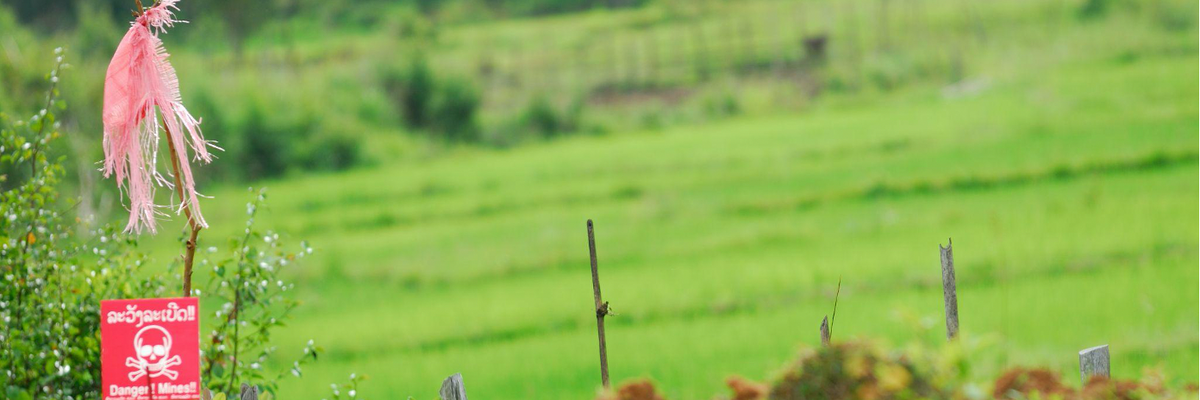It’s been 30 years and I can still hear my father’s voice.
“This is the path that you take to school. Only walk along this road. If you veer off, the nagas, tigers, and ghosts will come get you!” My father told my brother and me as we ran ahead of him, screaming happily as he pretended to struggle to catch up to us.
He caught up, took my hand, and stared down at me. I saw the worry in his eyes.
The consequences of war are immeasurable. They span generations and go beyond physical destruction, acting as powerful forces that loom over our lives — whether we invite them to or not.
Survivors know that war is not over when the superpowers say it is. Instead, it is often the beginning of more suffering and a long, nonlinear path to healing and closure from trauma.
Today, I am fearful and disappointed to learn that President Biden has not yet reversed the destructive Trump policy on landmines reopening the door for their use, which set our country backwards when we should be looking forward and valuing lives, even if they are not American. Have we not learned from our mistakes?
From 1964 to 1973, the United States dropped over 2.1 million tons of ordnance over Laos during 580,000 bombing missions — equal to a planeload of bombs every 8 minutes, 24 hours a day for 9 straight years.
This earned Laos the unwanted title of being the most bombed country per capita in history. It wasn’t even a country that was at war with America.
An estimated one-third of the bombs dropped did not explode, leaving Laos contaminated with vast quantities of unexploded ordnance. To date, less than one percent has been cleared and over 25,000 people have been killed or injured since the bombing ceased. Other gifts left behind during this period include landmines and Agent Orange. Each is designed to do one thing: Kill now or kill later.
I didn’t realize there were so many dangers lurking around me as a 6-year-old walking to school in Laos. My parents didn’t tell me that every day, it was a risk allowing their children to leave the house because of the millions of bombs potentially buried just inches beneath our feet.
They tried to shield us until they could no longer do so. In 1990, they made the decision to uproot us and start a new life in the very country that nearly destroyed Laos: The United States.
My siblings and I were all born decades after the so-called Secret War, yet it is still impacting our lives today. Although we left, we cannot escape the legacies of war, only mitigate their impact. Adding more landmines or any weapons to the world is not the answer.
In the wake of the U.S. bombings, 25 percent of the population of Laos became refugees. Countless historical and religious sites were destroyed, and innocent civilian blood was spilled on the soil of Laos. Families like mine were displaced, separated, and forced to start a new life in a new culture, land, and language. My parents often worked two to three jobs in order to make ends meet. This was not the worst of it.
Those who escape war have to deal with the emotional trauma and guilt of leaving their countrymen behind, knowing that there’s still a threat from unexploded ordnance and landmines. This reality was brought home on February 4, 2021, when five children were walking home from school near the Lao capital of Vientiane, just blocks away from where I grew up. These five boys, all under the age of 10, spotted what looked like a ball and started playing with it. The “ball” exploded and immediately killed two of the boys and left the remaining children severely injured.
We must renounce these indiscriminate weapons that will continue to kill decades after they were placed.
President Biden needs to show American leadership by boldly accelerating a plan within the next two months to join the 164 other countries who have made the humane decision to sign the international Mine Ban Treaty and the 123 countries who have pledged their support to the Convention on Cluster Munitions.
As a swift first step, the president should immediately prohibit the U.S. military from acquiring and using landmines and destroying all stockpiles of these weapons.
As someone who has seen firsthand what it is like to have to live in a bomb-littered land, I am proud to lead Legacies of War's efforts to support bomb clearance and survivor assistance. It is also an honor to represent my team and serve on the Steering Committee of the U.S. Campaign to Ban Landmine and Cluster Munition Coalition.
Let’s stop these deadly policies and usher in an era where we value the lives of children and their families no matter where they live.














